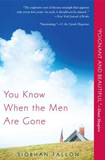Reading Guide Questions

Please be aware that this discussion guide will contain spoilers!
Introduction
There is an army of women waiting for their men to return to Fort Hood, Texas. As Siobhan Fallon shows in this collection of loosely interconnected short stories, each woman deals with her husband's absence differently. One wife, in an attempt to avoid thinking about the risks her husband faces in Iraq, develops an unhealthy obsession with the secret life of her neighbor. Another woman's simple trip to the PX becomes unbearable when she pulls into her Gold Star parking space. And one woman's loneliness may lead to dire consequences when her husband arrives home. In gripping, no-nonsense stories that will leave you shaken, Siobhan Fallon allows you into a world tightly guarded by gates and wire. It is a place where men and women cling to the families they have created as the stress of war threatens to pull them apart.
Discussion Questions
- In the first story, "You Know When the Men Are Gone," why does the narrator develop such an obsession with her neighbor? While it turns out that Natalya is worthy of Meg's scrutiny, is it easier for Meg to be a nosy neighbor than for her to focus on the danger her husband faced overseas?
- Infidelity is a recurring theme in many of the stories. Did this surprise you?
- Most of the stories take place in Fort Hood. Why do you think "Camp Liberty" is included in the collection if it takes place in Iraq? Is it in keeping with the other stories?
- In "Camp Liberty," "Leave," and "The Last Stand," the main characters are men. Does that change the feel from the rest of the collection, which is primarily from a female point of view?
- Many of the stories in You Know When the Men Are Gone are about the relationships between men and women. How would these stories change if the protagonists were flipped? If, say, "Inside the Break" was told from Manny's point of view instead of Kailani's? Or if "Leave" followed Trish instead of Nick?
- In "The Last Stand," why does Helena sleep with Kit in the hotel room? Do you find her sympathetic?
- In "Remission," Ellen feels that she is pitied by the other wives because of her cancer, but considered lucky because her husband has not been deployed. Does either of these circumstances outweigh the other? Is there a sliding scale of "tragedy" and "luck" in the lives of the families in Fort Hood? In your own life?
- "Inside the Break" mentions pamphlets with such titles as "Roadmap to Reintegration," "What to Expect When Deployed Soldiers Return," and "Communicating with Your Spouse." Is it possible to sum up, in writing, the vast emotional landscape that families and soldiers experience upon the soldiers' return? Do you think Siobhan Fallon attempted to do that with this collection? If you think so, did she succeed?
- What do you think the husband does at the end of "Leave"?
- In "You've Survived the War, Now Survive the Homecoming," the sign refers to drunk driving, but do you think the author intends it as a metaphor for more?
- In the same story, toward the end, Fallon writes: "Their fate depended on whether Carla walked out of the room with the baby or stood next to her husband. She bit her lip and wondered if this was the sum of a marriage: wordless recriminations or reconciliations, every breath either striving against or toward the other person, each second a decision to exert or abdicate the self." Do you agree with this take on marriage? Or do you think it's applicable only under extreme circumstances?
- Which is your favorite story, and why?
- Obviously the stories in You Know When the Men Are Gone are tied together by Fort Hood. What other themes do the stories share?
Unless otherwise stated, this discussion guide is reprinted with the permission of NAL.
Any page references refer to a USA edition of the book, usually the trade paperback version, and may vary in other editions.

 Book Reviewed by:
Book Reviewed by:



